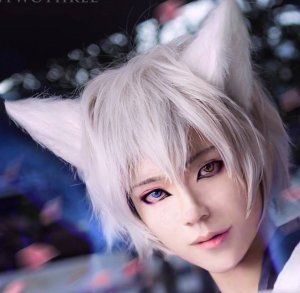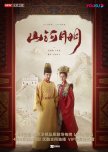Precious Chinese History, Poor Editing
The Imperial Age is the story of Zhu Di (Emperor Yongle of Ming Dynasty, reigned 1402 to 1424) from his youth to his death at 64 years old. Compared with other Ming Dynasty dramas, this drama has fewer fictionalized events though some historical events have been watered down to make the characters more appealing, while others have been dramatized for dramatic effects. This version of the story is perhaps closest to the historical records.
Zhu Di was the fourth son of Zhu Yuanzhang who was the founding Emperor of Ming Dynasty (reigned 1368 to 1398). His oldest brother, Zhu Biao was the crown prince designated for the throne. As Zhu Yuanzhang and his wife have humble origin as peasants (Zhu Yuanzhang was said to be a monk), the dynamics within the household are like any families of the commoners addressing each other informally. The Zhu household lives in harmony with loving parents and amicable children. Unlike most palace dramas, in this drama, it is very refreshing to watch the informality of parental and sibling relationships, with the Empress personally cooking in the kitchen for her family with no fanfare (there’s no wastage of food as in The Royal Feast, another drama set in Ming Dynasty). Palace life is simpler and happier.
Cheng Yi acts as the juvenile Zhu Di from episode 1 to episode 9. For once, Cheng Yi gets a happy and mischievous role as a prince who is well loved and pampered by his parents and siblings. His acting here is convincing as a 13-16 year old boy and rather funny as he gets paddled on the backside multiple times for his disobedience, and the actor’s bare back is even shown, fleetingly, when he’s being tendered for the wound.
Feng Shaofeng becomes the young 17 year old Zhu Di until his death at 64 as Emperor Yongle. Feng Shaofeng has a very affable demeanor, making the Zhu Di character very lovable, though he looks too mature for a 17 year old initially. Despite that, Feng Shaofeng looks very regal and authoritative, and has the charisma of an emperor. The drama lays out carefully all the events that have taken place prior to the uprising / civil war, and how Zhu Di comes to wrangle power from his nephew and become the Emperor. Ruthless and cruel as recorded in history books, the drama manages to show such cruelty is justifiable and the character is indeed a deserving respectable figure. Whatever it may be, I am not a historian and it’s not my place to judge the accuracy of such depiction. For me, the logic makes sense and ties in very well with the rest of the story and hence to call Zhu Di a great Emperor of his time.
My Verdict
The original version of the drama is said to be 80 episodes long. It is trimmed down to 45 episodes to fulfill the current government requirement. As such, one can imagine how the final product would become with a cut down of almost 50% of the work completed. There are many skipped scenes, making the story disjointed and can be confusing for non-Mandarin speakers. It’s at times like watching a jigsaw puzzle with the tail placed on the face, and the mouth on the rear side.
Despite the horrendous editing, this drama is still very enjoyable for its authenticity to the actual events. Though a palace story, there are no usual harem cat fights, no rivalry and scheming among the princes, but with a lot of resignations, tears and heartaches of losses. Feng Shaofeng has wept multiple times here with a unique wail. There are also long scenes of both the Emperor Hongwu’s (Zhu Yuanzhang’s) and Emperor Yongle’s (Zhu Di’s) accomplishments in their land reform, establishment of secret police (Jinyiwei aka Embroidered Uniform Guard), purging and execution of officials and their families, wars with the north-east, new capital and foreign engagement, military, bureaucratic reform, Zheng He’s expeditions to the south seas (just by-passingly, not in great details) etc. These scenes can be boring for some viewers who are more interested in action packed story telling. Having said that, some details are very funny and humorous. I believe many of such delightful details have been deleted in order to retain the main events for a shorten version of the story.
Emperor Hongwu has 26 sons from his Empress and various concubines, but in the drama, he’s shown to be only with his Empress all the time displaying his devotion to her. Likewise for Emperor Yongle who is devoted only to his wife Empress Xu. Therefore, there are no cat-fights among the concubines, and no revelation of how many concubines perish with the Emperors when they die. All in all, this drama tries to emphasize on devotion among the men and women in the story which may not be a reality.
The battle scenes are very well made though certain scenes have been reused again and again for various different battles. The endings of most of the characters are similar to what have been recorded in history books, with a few exceptions to make them more palatable for the viewers.
The whole cast is commendable, and the official soundtracks are touching and beautiful. If you are a Chinese history fan, you’d love this drama. I have thoroughly enjoyed it despite some of the shortcomings due to the massive editing. The original version (80 episodes) must have been a masterpiece.
Recommended for history buffs. Great watch! Bravo!
Zhu Di was the fourth son of Zhu Yuanzhang who was the founding Emperor of Ming Dynasty (reigned 1368 to 1398). His oldest brother, Zhu Biao was the crown prince designated for the throne. As Zhu Yuanzhang and his wife have humble origin as peasants (Zhu Yuanzhang was said to be a monk), the dynamics within the household are like any families of the commoners addressing each other informally. The Zhu household lives in harmony with loving parents and amicable children. Unlike most palace dramas, in this drama, it is very refreshing to watch the informality of parental and sibling relationships, with the Empress personally cooking in the kitchen for her family with no fanfare (there’s no wastage of food as in The Royal Feast, another drama set in Ming Dynasty). Palace life is simpler and happier.
Cheng Yi acts as the juvenile Zhu Di from episode 1 to episode 9. For once, Cheng Yi gets a happy and mischievous role as a prince who is well loved and pampered by his parents and siblings. His acting here is convincing as a 13-16 year old boy and rather funny as he gets paddled on the backside multiple times for his disobedience, and the actor’s bare back is even shown, fleetingly, when he’s being tendered for the wound.
Feng Shaofeng becomes the young 17 year old Zhu Di until his death at 64 as Emperor Yongle. Feng Shaofeng has a very affable demeanor, making the Zhu Di character very lovable, though he looks too mature for a 17 year old initially. Despite that, Feng Shaofeng looks very regal and authoritative, and has the charisma of an emperor. The drama lays out carefully all the events that have taken place prior to the uprising / civil war, and how Zhu Di comes to wrangle power from his nephew and become the Emperor. Ruthless and cruel as recorded in history books, the drama manages to show such cruelty is justifiable and the character is indeed a deserving respectable figure. Whatever it may be, I am not a historian and it’s not my place to judge the accuracy of such depiction. For me, the logic makes sense and ties in very well with the rest of the story and hence to call Zhu Di a great Emperor of his time.
My Verdict
The original version of the drama is said to be 80 episodes long. It is trimmed down to 45 episodes to fulfill the current government requirement. As such, one can imagine how the final product would become with a cut down of almost 50% of the work completed. There are many skipped scenes, making the story disjointed and can be confusing for non-Mandarin speakers. It’s at times like watching a jigsaw puzzle with the tail placed on the face, and the mouth on the rear side.
Despite the horrendous editing, this drama is still very enjoyable for its authenticity to the actual events. Though a palace story, there are no usual harem cat fights, no rivalry and scheming among the princes, but with a lot of resignations, tears and heartaches of losses. Feng Shaofeng has wept multiple times here with a unique wail. There are also long scenes of both the Emperor Hongwu’s (Zhu Yuanzhang’s) and Emperor Yongle’s (Zhu Di’s) accomplishments in their land reform, establishment of secret police (Jinyiwei aka Embroidered Uniform Guard), purging and execution of officials and their families, wars with the north-east, new capital and foreign engagement, military, bureaucratic reform, Zheng He’s expeditions to the south seas (just by-passingly, not in great details) etc. These scenes can be boring for some viewers who are more interested in action packed story telling. Having said that, some details are very funny and humorous. I believe many of such delightful details have been deleted in order to retain the main events for a shorten version of the story.
Emperor Hongwu has 26 sons from his Empress and various concubines, but in the drama, he’s shown to be only with his Empress all the time displaying his devotion to her. Likewise for Emperor Yongle who is devoted only to his wife Empress Xu. Therefore, there are no cat-fights among the concubines, and no revelation of how many concubines perish with the Emperors when they die. All in all, this drama tries to emphasize on devotion among the men and women in the story which may not be a reality.
The battle scenes are very well made though certain scenes have been reused again and again for various different battles. The endings of most of the characters are similar to what have been recorded in history books, with a few exceptions to make them more palatable for the viewers.
The whole cast is commendable, and the official soundtracks are touching and beautiful. If you are a Chinese history fan, you’d love this drama. I have thoroughly enjoyed it despite some of the shortcomings due to the massive editing. The original version (80 episodes) must have been a masterpiece.
Recommended for history buffs. Great watch! Bravo!
Was this review helpful to you?


 1
1 5
5 1
1




















